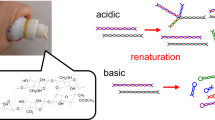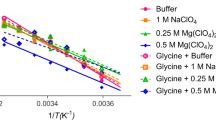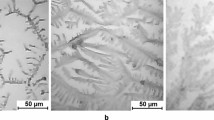Abstract
A STUDY of the absorption spectra of α- and β-hæmocyanin of Helix pomatia indicated that the copper bands of α-hæmocyanin, with their maxima at 346 and 580 mμ, are not quite reproducible1. As a continuous decrease of the copper-bands was liable to occur, the extinction of hæmocyanin preparations has been followed over several months.
This is a preview of subscription content, access via your institution
Access options
Subscribe to this journal
Receive 51 print issues and online access
$199.00 per year
only $3.90 per issue
Buy this article
- Purchase on Springer Link
- Instant access to full article PDF
Prices may be subject to local taxes which are calculated during checkout
Similar content being viewed by others
References
Heirwegh, K., Borginon, H., and Lontie, R., Fourth Int. Congr. Biochem., Vienna 2 (1958).
Lontie, R., Dessent, M., and Heirwegh, K., Meded. vlaamse Acad. El. Wet., 13, No. 1 (1951).
Bacq, Z. M., and Ghiretti, F., Arch. Int. Physiol., 59, 288 (1951).
Redfield, A. C., Biol. Bull., Woods Hole, 58, 238 (1930).
Horsmans, J., after Lontie, R., Meded. vlaamse chem. Ver., 16, 110 (1954).
Litt, M., and Boyd, W. C., Nature, 181, 1075 (1958).
Author information
Authors and Affiliations
Rights and permissions
About this article
Cite this article
HEIRWEGH, K., LONTIE, R. Decrease of the Copper Bands of Helix pomatia Hæmocyanin. Nature 185, 854–855 (1960). https://doi.org/10.1038/185854a0
Issue Date:
DOI: https://doi.org/10.1038/185854a0
Comments
By submitting a comment you agree to abide by our Terms and Community Guidelines. If you find something abusive or that does not comply with our terms or guidelines please flag it as inappropriate.



